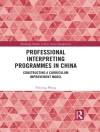This book brings together a broad, interdisciplinary group of leading scholars to critically assess a recent proposal within translanguaging theory called deconstructivism: the view that discrete or ‘named’ languages do not exist. Contributors explore important topics in relation to the deconstructivist turn in translanguaging, including epistemology, language ideology, bilingual linguistic competence, codeswitching, bilingual first language acquisition, the neurolinguistics of bilingualism, the significance of language naming to Indigenous language reclamation efforts, implications for bilingual education and language rights, and the effects of translanguaging on immersion programs for endangered languages. Contributing authors converge on support for a multilingual perspective on translanguaging which affirms the pedagogical and conceptual aims of translanguaging but rejects deconstructivism. The book makes a valuable contribution to the development of translanguaging theory and will be required reading for scholars and students interested in one of the most vibrant and vital debates in contemporary applied linguistics.
Jadual kandungan
Contributors
Preface: Jeff Mac Swan
Chapter 1. Jeff Mac Swan: Introduction: Deconstructivism – A Reader’s Guide
Part 1: Inter-speaker Language Variation
Chapter 2. Vivian Cook: Multi-competence and Translanguaging
Chapter 3. James Paul Gee: Experience Coding and Linguistic Variation
Part 2: Codeswitching
Chapter 4. Jeff Mac Swan: Codeswitching, Translanguaging and Bilingual Grammar
Chapter 5. Peter Auer: ‘Translanguaging’ or ‘Doing Languages’? Multilingual Practices and the Notion of ‘Codes’
Chapter 6. Rakesh M. Bhatt & Agnes Bolonyai: Codeswitching and its Terminological Other – Translanguaging
Part 3: Psycholinguistics
Chapter 7. Fred Genesee: Evidence for Differentiated Languages from Studies of Bilingual First Language Acquisition
Chapter 8. Rebecca A. Marks, Teresa Satterfield and Ioulia Kovelman: Integrated Multilingualism and Bilingual Reading Development
Part 4: Language Policy
Chapter 9. Sheilah E. Nicholas and Teresa L. Mc Carty: To ‘Think in a Different Way’ – A Relational Paradigm for Indigenous Language Rights
Chapter 10. Terrence G. Wiley: The Grand Erasure: Whatever Happened to Bilingual Education and Language Minority Rights?
Part 5: Practice
Chapter 11. Joanna Mc Pake and Diane J. Tedick: Translanguaging and Immersion Programs for Minoritized Languages at Risk of Disappearance: Developing a Research Agenda
Chapter 12. Christian J. Faltis: Understanding and Resisting Perfect Language and Eugenics-based Language Ideologies in Bilingual Teacher Education
Stephen May: Afterword: The Multilingual Turn, Superdiversity and Translanguaging – The Rush from Heterodoxy to Orthodoxy
Index
Mengenai Pengarang
Jeff Mac Swan is Professor of Applied Linguistics and Language Education and Professor of Neuroscience and Cognitive Science at the University of Maryland, USA. His research focuses on the linguistic study of bilingualism and codeswitching (or language alternation) and the implications for multilingual students in education. His recent books include Multilingual Perspectives on Translanguaging (Multilingual Matters, 2022) and Codeswitching in the Classroom (with Christian J. Faltis, Routledge, 2020).












